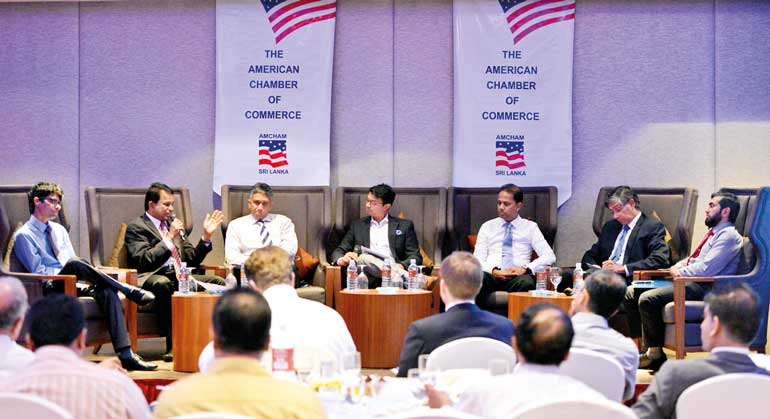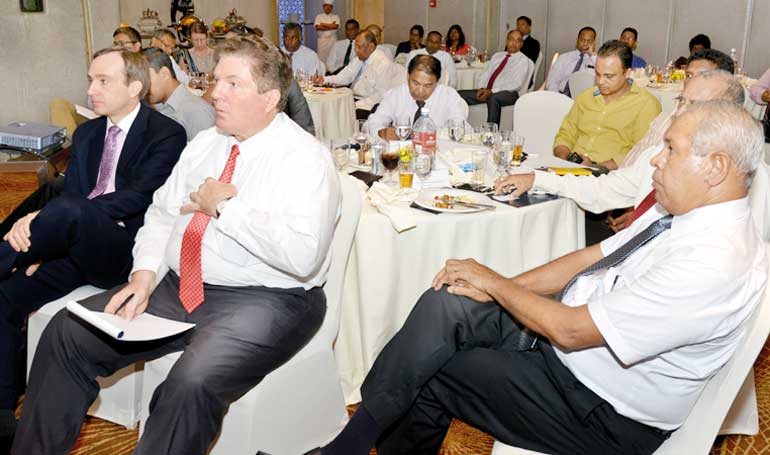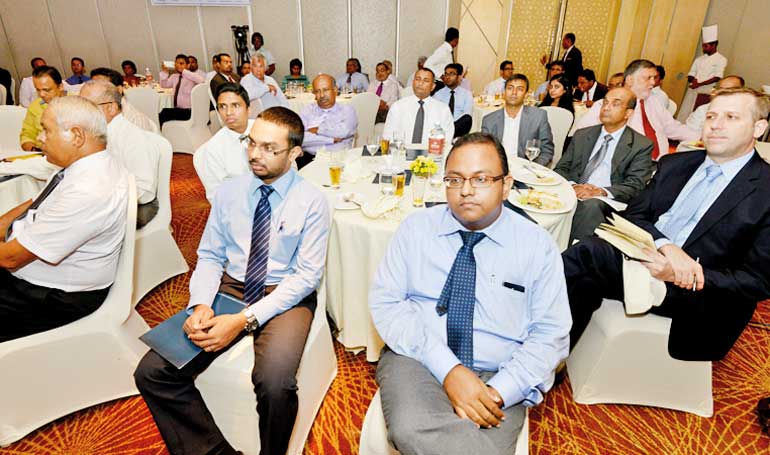Wednesday Feb 18, 2026
Wednesday Feb 18, 2026
Monday, 9 May 2016 00:00 - - {{hitsCtrl.values.hits}}
 From left: Environmental Sustainability Mas Intimates General Manager Dr. Vidhura Ralapanawa, Ministry of Power and Renewable Energy Secretary Dr. B. M. S. Batagoda, Sri Lanka Petroleum Resources Development Secretariat Director General Saliya Wickramasuriya, Moderator Kings Investment Ltd Director Niro Cooke, Sri Lanka Public Utilities Commission Director General Damitha Kumarasinghe, Energy Forum Board Member Dr. Anil Cabraal and Vidullanka Managing Director Riyaz Sangani - Pix by Daminda Harsha Perera
From left: Environmental Sustainability Mas Intimates General Manager Dr. Vidhura Ralapanawa, Ministry of Power and Renewable Energy Secretary Dr. B. M. S. Batagoda, Sri Lanka Petroleum Resources Development Secretariat Director General Saliya Wickramasuriya, Moderator Kings Investment Ltd Director Niro Cooke, Sri Lanka Public Utilities Commission Director General Damitha Kumarasinghe, Energy Forum Board Member Dr. Anil Cabraal and Vidullanka Managing Director Riyaz Sangani - Pix by Daminda Harsha Perera


By Charumini de Silva
American Chamber of Commerce (AmCham) in Sri Lanka presenting its draft White Paper findings on the Power and Energy sector said the energy supply in the country is not adequate, sustainable and stable.
According to the draft White Paper most of the stakeholders especially in the manufacturing industry had felt that the quality of the power they receive is not to their satisfaction, resulting in high dependency on standby generators to support their power needs.
AmCham Vice Chairman Ravin Basnayake pointing out the outcomes of the draft White Paper on the Power and Energy Sector said Sri Lanka’s current energy policy is predominately focused on the electricity sector, and not necessarily holistic document which looks after the entire energy requirement of the country.
“One of the key weaknesses in the existing energy policy of Sri Lanka was that it had concentrated on electricity and seems biased towards current suppliers of electricity. The policy paper had been drafted predominantly based on Ceylon Electricity Board’s (CEB) capabilities and abilities,” he noted.
Despite the build-up of excitement on the natural gas resources that everyone had been talking about in the recent past, there had never been a discussion of how it is taken into our national energy policy.
“They say that we have commercial quantities of natural gas, but there is no proper dialogue or direction about the suitability in the energy policy,” he pointed out.
In terms of private sector role in the power and energy sector Basnayake asserted that there is no consistent or defined approach in the existing energy policy to engage the private sector.
“The association between the energy sector and private sector had been a ‘love hate’ relationship. It is a very ad-hoc process. There are no defined guidelines as to how the private sector operates in this model and also there seems to be a limitation around what the private sector can do and cannot do,” he explained.
Basnayake said the draft White Paper was compiled with the support and findings of a number of stakeholders both users as well as suppliers of energy, regulators, as well as environmentalists adding that they are open for more feedback to take it up on themselves to investigate it further before finalising it.